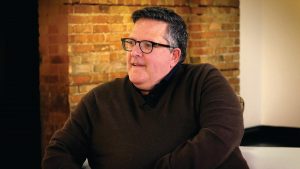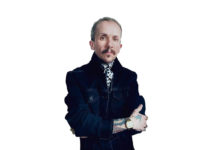
This week, our attention is towards Truth and Politics. Therefore, Manuel DaCosta interviewed Bob Richardson for Here’s The Thing (Camões TV). Richardson has spent most of his life involved in the community, sitting on Boards, helping running organizations, involved in business and in politics. Including, working alongside Portuguese politicians during their elections.
With a career focused on Public Affairs and Government Relations, Bob Richardson is the right individual to analyze how are politics today and how much of it can we really trust.
Manuel DaCosta: This week, we at MDC are debating Truth and Politics. In my opinion, those two subjects don’t really go together anymore. What is your opinion?
Bob Richardson: I think it does and it doesn’t, we have to work at it to make sure there’s truth in politics. If we look at the USA, right now it’s like a parallel universe. Some people watch Fox TV, others watch MSN or CNE, and you would think you’re in a different country. We have to work to make sure we don’t become like that. At least, we can agree on the facts, even if we can’t agree on what should happen with the facts. That’s important, it’s almost like a Canadian value that we have to try to maintain.
MDC: Considering our connection with the USA, especially on economics and media consumption, do you think the way the media portraits politics and how their politics has evolved have had an affect on how Canadian politics is and will be practiced in the future?
BR: I think so, and I think it has been negative. Politicians used to get elected, go to a legislative party, they worked together, sometimes they would go out for dinner, they would try to get to know each other and try to make improvements on certain things. They might disagree but generally they got along. Today, there’s more separation, there’s not as much communication and they throw things at each other that are not productive.
Right now, we should be focused on the pandemic, on ways to open the economy. As opposed to reviewing every contract in the middle of a pandemic, to me, that shouldn’t be our priority, the focus should be in getting people back to work.

MDC: In a country like the United States where politics is a dirty game, how can the population have such different views of governance and politics? How can a country govern itself?
BR: In my opinion, that is a country that really is in trouble, it’s becoming split. A country of rich and not rich. Besides, race is also a big issue in the United States. Comparing to Canada, another huge difference is that their politics are all driven by money. They are going to spend billions of dollars on that presidential election. We don’t do that here; we regulate the amount of money.
What we should try to do is make sure there’s less difference between rich and poor, that we continue to work hard on the issue of race, we have to make sure money doesn’t become the key factor in politics. If we do these three things, we can escape some of the excesses that prevail in the US system.
MDC: Regardless of who wins, the US election will have a big impact on the Canadian economy and politics. The last four years have brought to the surface situations most Canadians didn’t thought that existed before. I’m not asking a preference on a candidate, but which candidate would benefit Canada the most in economic terms?
BR: That’s a good question and you could probably make an argument for either. Personally, I think Biden does, for a couple of reasons: first stability, we at least will have stability with him for the next four years and he has 50 years of experience in track record working with partners. The other guy doesn’t want to do it. Second, Biden likes Canada, knows and understands the country, he’s been around for a long time which gives us an opportunity to build something with him, the Auto Pact is a good example of that. Third is infrastructure, he wants to rebuild a lot of the US bridges and other infrastructures and that could be helpful for us. That’s why I think Biden is probably a better choice, but this will be a wild election.
MDC: If Trump wins, what can we expect for the next four years?
BR: He hasn’t really said what he would do in the next four years, so I suspect it will be a daily drama show, it’s exhausting (laugh)… it’s great for media. I think he will be focused on the stock market, on big business and keeping taxes low for them, but I’m not sure if you won’t see the acceleration of the rich and the poor which will cause problems in the long run.
MDC: Movements such as Black Lives Matter have forced politicians to reassess and look at how they govern population. Do you think this new panorama will bring a new type of politician?
BR: Politics has changed. As of today, there’s one hundred women in the House of Commons, two of them elected last night (October 26). That’s a massive change compared to 50 years ago and that changes the way politics gets run. Also, communities are much more active and expect to have a voice in government. Our politics tend to be younger: right now, our oldest candidate for Prime Minister is Justin Trudeau. In the United States the two candidates are 77 and 74 years old. I’m not an ages person, particularly now that I’m getting older, but I don’t think that at 77 or 74 you should be President of the United States. We want to have a younger and more diverse group of politicians, and a lot of women there as well.
MDC: On the other side, we had Trudeau who had very little political experience on his first term and I think he is still learning…
BR: There’s no question he did some rookie mistakes.
MDC: One of the reasons why we are choosing this topic, Truth and Politics, is because there’s been cases of scandals in Canada during his mandate. But I don’t see the push back of the population regarding these scandals. Do people really care about these scandals anymore?
BR: I think people care about them if they are real scandals. Going on a holiday, in the Bahamas, to a guy’s house which is friends of your father, I’m not sure if it really is a scandal. I don’t think they handle it well, but I don’t see that as a massive scandal.
The WE Charity thing, of which I’m not a big fan of the organization… but they were trying to get a program up and running. It was not like someone was pulling strings and getting rich. Canadians scandals, by international standards, don’t even qualify as scandals. Canadians are pretty fair minded, so they would look at it and won’t consider a scandal. They might think it’s stupid, that they could have dealt with it better, but they don’t think it’s a scandal. Right now, the problem is that every time someone does a mistake, they call it a scandal and it’s not necessarily the case.
MDC: The problem is the messaging and the lack of information to the citizens… Including regarding the pandemic.
BR: We have been in this pandemic for seven months, in the case of all three levels of Government they should give us an update on how we are doing and what we need to do in the next months. I think there are people that are genuinely confused. We were told that we were doing this to flatten the curve to make sure there’s capacity at the hospitals, now we are being told something different… churches can open, but gyms can’t. There are contradictions that people are finding frustrating, so I think the politicians, in all levels of government, owe us an update on the state of the country, the province and the city.
MDC: We are depending on information and reports from the Health Departments, as the Medical Officers of Health. Do they really understand what people are going through as far as messaging concern and thinking about the future of their lives? Is that being taken into consideration when they are making those decisions?
BR: They are trying to do their best, they were thrown to this seven months ago, but they do need to be talking to more people. Tens of thousands of people aren’t getting medical treatment for cancer right now, that will be a huge problem in the future. We are putting tens of thousands of people out of business, particularly in small businesses which will be though to come back.
What is the economic cost and the mental health cost of that? The politician’s job is not just to parrot what the Medical Office says, it’s to take a look at everything and make calculated decisions. The problem with restaurants was very small and we still closed seven thousand of them. This broad swap we are doing is damaging ten thousands of lives.
MDC: In Quebec, they are starting to rebel against these measures because they are not being shown the statistics. If this turns to a situation where the rest of the country starts doing the same, will the police be called to put everybody in place?
BR: I don’t think so. I think the politicians believe they are in charge, but ultimately the people are in charge. Politicians need to be reasonable about what they are doing. They have to try to make things safe, but we also have to be working on trying to get things back to normal and that won’t happen if we listen exclusively to the Medical Officer. They all say we are all in this together, but that’s not true when a huge portion of the population gets a check every two weeks, has its benefits all paid for and continue to contribute to a pension. While the rest, small business owners for example, are trying to get clients, keep our staff, trying to pay rent or keeping CRA away from the door. Those are two different worlds and I’m not sure if the public sector is appreciative of how hard this world is.
Read more: • Trudeau says budget update won’t have fiscal anchor, suggests one is coming after crisis ends
MDC: It’s time for us to get an economic review or a budget so we can be aware of where are we at.
BR: I give credit to the Province, the Premier Ford and Finance Minister Rod Phillips, they are going to do that in November 1st here in Ontario. I also think it’s time for the Federal Government to give a substantive economic update, let’s see how we are doing. I think they have done a pretty good job, they have kept a lot of people afloat, they moved quickly, and people got money fast. I also think we need a state of the City speech to give us an idea of where we are at and what is the plan to reopen things in the next few months. The politicians need to be looking forward and stop being paralyzed in the moment.
MDC: How should people interpret the message that comes from political parties and politicians?
BR: Today, in Canada, in politics in both the Provincial and City level, things have been good truth wise. The people in power have tried to work with those that are not in power, so things would get accomplished.
At the Federal level, and there’s blame on both sides there, they haven’t done a good job. The opposition is trying to bring down the government in the middle of a pandemic and, on the other side, the Government is not being transparent enough to satisfy the opposition.
MDC: As a country and as a population, how will we recover psychologically and financially from this pandemic?
BR: We can recover but we got to get moving back to what is the new normal. We have to start opening up our financial core. The country can’t recover If Toronto doesn’t recover as that is the economic engine of the country. We have to open things, start talking about infrastructure and build more to put more people back to work and we need to do it in a safe fashion. There’s a great opportunity to do things, but we need to talk less and do more.
MDC: You have been involved in the Portuguese community, in politics. As a community we are still building our inroads into the political system… what would be your advice to the community to be more successful in the political game?
BR: I would advise to continue to be involved, continue to elect people in all parties at all political levels. You need to be thinking how we bring up the next generation of people, who are they and how can we helped them to make sure they can be leaders.
Transcrição: Inês Carpinteiro








Redes Sociais - Comentários